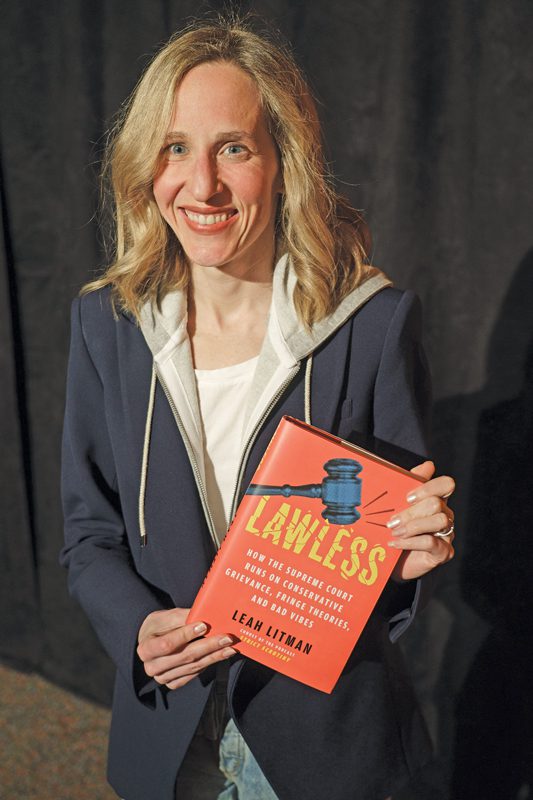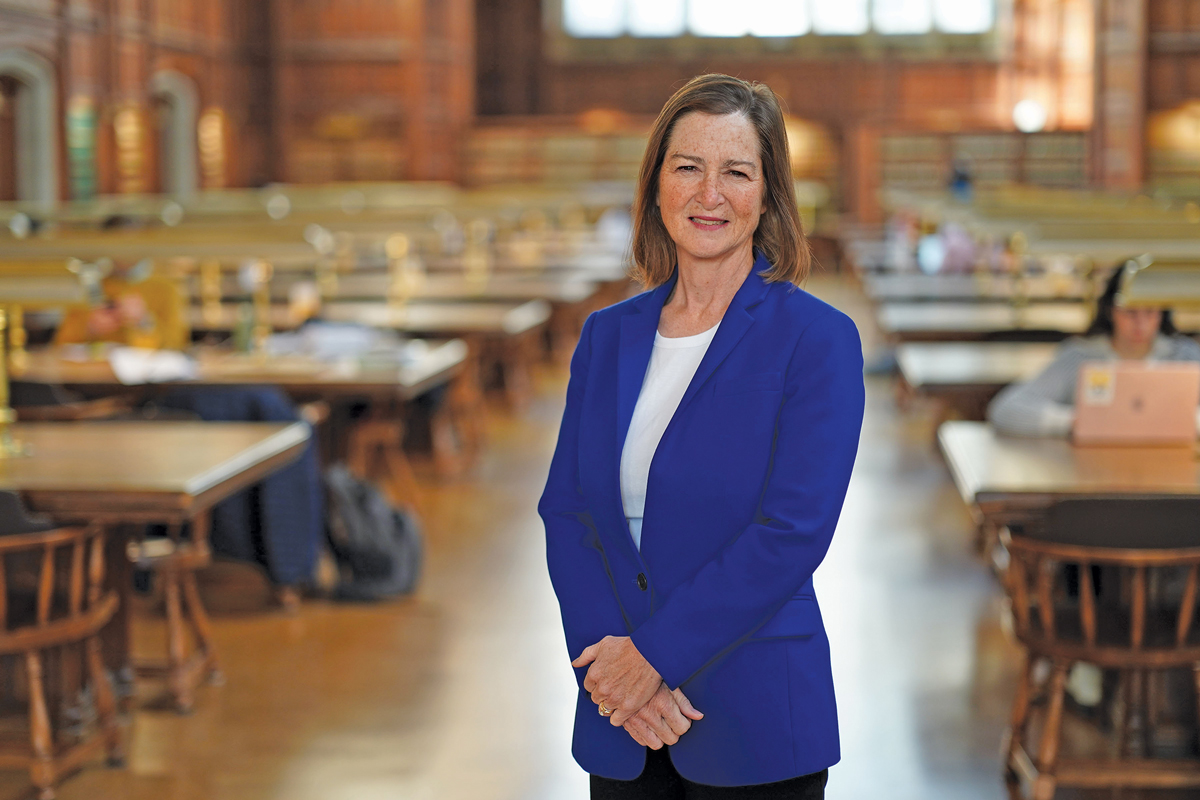
Photo by J. Adrian Wylie
Leah Litman takes the stage at Hear.Say, the improv theater and brewery on W. Liberty. She engages the audience at once.
She might pass for a stand-up comic, or a grad student out for an evening, but Professor Litman, as she is introduced, is sharing memories of her days clerking for justice Anthony Kennedy at the U.S. Supreme Court. She describes the lunches clerks are asked to host for justices of the opposite party. The justices select the venue; the clerks pay the bill. Antonin Scalia would take clerks to one D.C.’s most expensive restaurants and work up a hefty bill. Stephen Breyer talked loudly about cases on the court’s docket.
The audience can’t stop laughing.
Litman doesn’t require a stage to get laughs. She’s not above a sarcastic aside in Strict Scrutiny, the podcast she cohosts with Melissa Murray and Kate Shaw—self-described as “three badass constitution law professors”—or swearing as they discuss an outrageous court decision. The in-depth and irreverent podcast that began in 2019 won the 2023 Ambie, which Murray calls “the Oscar of podcasting,” for its coverage of Dobbs v. Jackson Women’s Health Organization. Dobbs effectively overturned Roe v. Wade, the 1973 decision that for almost fifty years had protected abortion rights nationwide.
When Murray, who teaches law at New York University, testified against Brett Kavanaugh at his confirmation hearing, Litman wrote to her to express appreciation. “People usually write about what’s not quite right,” Murray says. “I just think it’s nice when people reach out to say you’ve done something well.”
They started talking about the podcast shortly after Kavanaugh was confirmed. “People were underappreciating how significant that change in the court would be,” Litman says. She had never met Murray or Shaw, but she knew their work and was sure they could help her communicate the urgency of the situation. And they could have fun doing that.
Litman brings the same blend of humor and scholarship to her new book, Lawless: How the Supreme Court Runs on Conservative Grievance, Fringe Theories, and Bad Vibes. Pop culture references that include Barbie, Game of Thrones, and Taylor Swift help illustrate her witty analytic history of key SCOTUS rulings.
The book argues that the court conservatives distort the law to protect religious conservatives and Republicans—threatening democracy in the process. Murray calls it “quintessentially Leah. … She is a person who lives in both legal culture and pop culture.” In June, that combination boosted Lawless to number four on the New York Times hardcover nonfiction bestseller list.
It also has provoked “a few nasty emails, DMs, letters, voicemails, social media comments” from MAGA folks, Litman writes—“but nothing I haven’t gotten before from TV or podcasting! (at least not yet).”
The pop references aren’t put on: Litman “went to six Era tour concerts,” says the Swiftie. She even buys extra tickets to share. “She realized some of her friends had never experienced the Era tour,” says Kathrina Szymborski Wolfkot, senior counsel at New York University’s Brennan Center for Justice, who caught the tour with her in Indianapolis.
“One thing that surprises people about me is I’m an introvert,” says Litman, who says she spent most of her childhood reading. “I would hole myself up in my room with piles of books and retreat there and read as much as I could,” she recalls—nonfiction and fiction, from Pride and Prejudice to Nancy Drew mysteries.
“She’s so quiet she can be very intimidating,” says Wolfkot, who met Litman when they both worked on the Michigan Law Review—Litman as editor-in-chief, Wolfkot as managing editor. “Her generous heart is … even more pronounced than her incredible legal mind.”
“Her life is a series of doing people favors. … I have long been completely obsessed with the podcaster Jon Lovett,” says Wolfkot, who never imagined she would meet her “celebrity crush” until Litman found a way to include her in a Zoom call with Lovett.
She doesn’t just help friends. Wolfkot says Litman took meticulous notes in law school. When anyone was absent, she would “photocopy them and anonymously put them into someone’s mailbox. She never advertised she was doing it.”
Litman, forty-one, grew up in Minnesota, the oldest of three sisters. One lives on the East Coast, the other on the West. “We try to do a sisters’ get-together at least once a year,” says Litman. This year, it was in Toronto when Taylor Swift appeared there.
She lives on the Old West Side and enjoys walking her dog, often with her partner and colleague on the U-M Law School faculty, Dan Deacon. They often walk through the Arb, Eberwhite Woods, or parks near Bach or Slauson schools.
In high school, her favorite classes were history and government, and the debate team was important to her. “I swam as a kid as well,” she says, and still does.
When she enrolled at Harvard, she majored in organic chemistry. “I like logical thinking,” she says, explaining that science and law both involve deductive reasoning, “working your way backward.”
Her memories of high school debate partly motivated her to switch to law, which brought her to U-M. After graduating in 2010, she clerked on the Sixth Circuit, then for Kennedy in 2011–12. There she witnessed a constitutional challenge to the Affordable Care Act that shook her. The experience “made me want to educate people about the court,” she says.
She practiced at WilmerHale, leaving to become a Climenko Fellow at Harvard Law in 2014, a program for aspiring law professors.
Susannah Barton Tobin, who heads the Climenko program, says that Litman inspired students and impressed colleagues. When Litman coauthored a petitioner’s brief before SCOTUS, she included one of her research assistants in the process. “Here was a second-year law student who, thanks to Leah, had contributed to the briefing in a crucial Supreme Court case and was getting to see her work in action,” Tobin emails. “She is, of course, brilliant and hardworking on her own. But she is also committed to teaching and inspiring younger lawyers (and older ones too) to join the cause in the service of justice.”
During a Q&A at Literati, which sponsored the local Lawless release event, someone asked Litman if she merely preaches to the choir. The question didn’t disturb her. In fact, she said she does. “I write to empower my community,” she says. She wants us to read her book, watch her podcast, hear her speak—and do something to make a difference. As she is doing.

